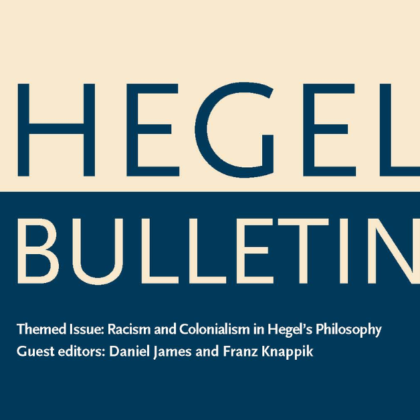Hegel in the era of Black Lives Matter
I remember, as if it were yesterday, the moment I committed to studying Hegel. I was reading the Phenomenology of Spirit cover-to-cover for the first time. One December morning, I lingered in bed reading ‘Conscience. The “beautiful soul”, evil and its forgiveness’. I was riveted. I rooted for Conscience—but despaired of its agency ever being recognized by the hard-hearted, judgy ‘beautiful soul’. I did not see this coming:
The true, i.e. the self-conscious and existent, equalization of the two sides is necessitated by and already contained in the foregoing. The breaking of the hard heart, and the raising of it to universality, is the same movement which was expressed in the consciousness that made confession of itself. The wounds of the Spirit heal, and leave no scars behind. (Phenomenology of Spirit, ¶669)
I sat bolt upright. It got better.
Each of these two self-certain Spirits has no other purpose than its own pure self, and no other reality and existence than just this pure self. But yet they are different; and the difference is absolute […]. (¶671)
I knew I would spend my life unpacking the liberatory force of this text.
And then I read The Philosophy of History and learned that Hegel gave liberation with one hand and took it with the other—extolled the consciousness of freedom in Europe and denied it of Africa. It is not lost on me that in the year we celebrate Hegel’s 250th birthday, Black Lives Matter, a movement to dismantle the anti-Black worldview Hegel co-authored, has become perhaps the largest social movement in U.S. history. Descendants of Africa have inspired global protests and are again making history, as Africa always has done, advancing the consciousness of freedom worldwide.
And so Hegel has two-fold contemporary relevance. He pushed the poisonous ideology of anti-Black racism and supplied its antidote: a theory of recognition.
I wish to say it plainly: Hegel’s recognition theory tells us that if we are to be free—all of us—we must recognise each other. His Phenomenology account corroborates claims by emancipatory movements that oppression takes root in our violations of each other’s legitimate social expectations (including rights) and that we end oppression by recognising appropriately every individual’s subjectivity and agency. (See Axel Honneth’s The Struggle for Recognition.) This coheres with his endorsement in the Philosophy of Right of recognising difference, the ‘right of particularity’ to express itself in all directions, in private and in public life (Philosophy of Right, §154).
I celebrate Hegel’s understanding of that. I approached him to be instructed by him. When his racism repelled me, his theory of recognition brought me back—because it is a key to our collective liberation.






